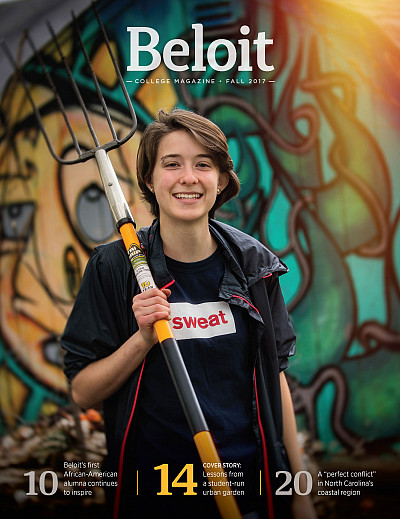Growing Local
On a rare sunny day in a July full of rain, Nicole Fredericks’17 and Preston Bui’20 helped Aliza Tresser’18 pull out the hose to water the Beloit Urban Garden for the first time that month. They are the three summer workers in charge of maintaining the crops just off Beloit College’s campus, and Tresser was trying to get through her duties before the Beloit Farmers’ Market ended just a few blocks away.
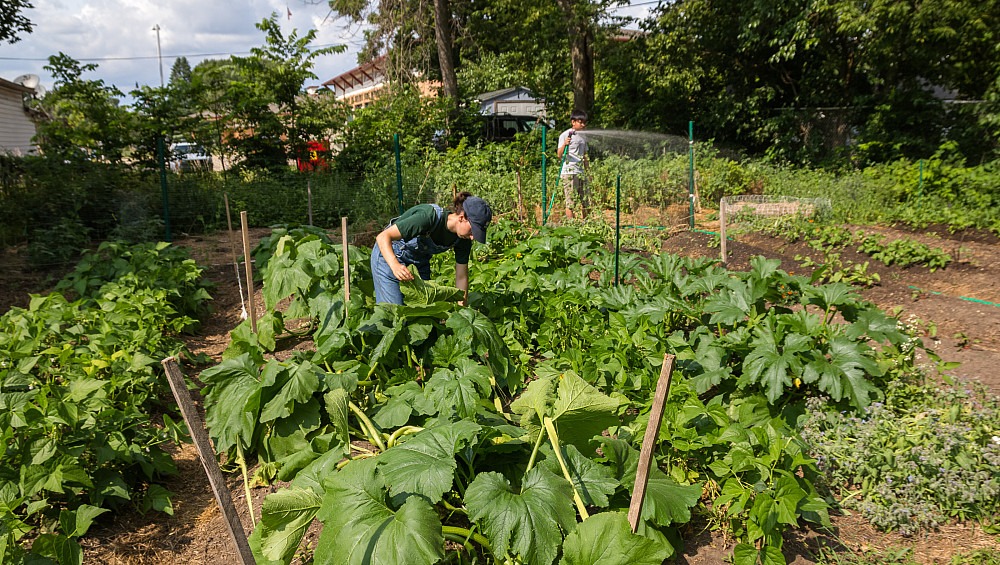
Credit: Viviana Nadowski
Tresser, an environmental studies major, always had a strong interest in community organizing and gardening, and through Beloit College’s sustainability program has been able to get hands-on experience that she hopes she can use while working on an urban garden after graduation. On that particular day, hands-on experience involved getting tangled up in a hose.
“We just put up a fence where our peas are,” says Fredericks, a media studies and theatre production major with a passion for organic farming. “It’s right where our hose goes, so everything’s a little different today.” The statement is a testament to the nature of the garden, affectionately known as “BUG”: a project always in flux with a constantly rotating group of students learning as they go. Tresser, Fredericks, and Bui had just a couple of months to make their mark on the garden before another group of students stepped in.

The garden grows at 1031 Church St., across from Karris Field in an empty lot the college purchased years ago in anticipation of possible expansion to the north. The project was started by students in 2013 to introduce sustainable agricultural practices to campus. From the beginning, the idea was to change the way students think about the food they eat and introduce simple ways to implement local and organic practices. Since then, the ebb and flow of volunteers and ever-changing vision have caused each season of the garden to evolve. Even as BUG gets more of its crops into the hands of the student body and gains visibility on campus, its future remains uncertain from one semester to the next. Each season, the viability of the harvest depends on financial stability, an unpredictable climate, and, of course, interest from students.
First in the line of students behind BUG was Kyle Bohrer, a political science major with a double minor in biology and environmental science, who graduated in 2014. “The idea for the BUG originally came to me during study abroad in Denmark when I was taking a course on sustainability in Europe,” Bohrer says. “I was lucky enough to see a ton of awesome urban gardens and environmental projects throughout Europe, and when I came back to Beloit I knew I wanted to start a garden.”
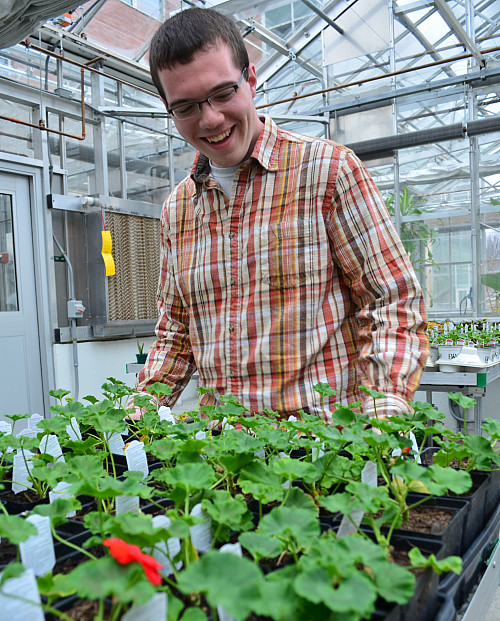
Credit: Courtney Yates’14
When he was back on campus, he partnered with fellow students Clara Baker’13 and Lena Wright’16 to get funding and club approval from student government, create partnerships with the Sustainability Fellows program and the on-campus food service provider, and find the actual land to cultivate. They worked through the winter semester to make sure that once the ground finally thawed, they could hit it running.
“I worked the garden the first summer with a few other students who stayed in Beloit for other projects,” Bohrer says. “The organization around the BUG and engagement with the school and community really grew over the next year. We hosted some alumni events in the garden for Homecoming, partnered with local farms for knowledge and equipment, and started visiting other schools to learn from their urban gardens, too.”
A majority of the students, whether they know it or not, are exposed to BUG directly on the plate. Bon Appetit, the company that runs the student dining program, has always run on a farm-to-table model, so deciding to partner with the garden was a natural fit. During the first year of BUG—which was Bon Appetit’s second year on campus—general manager Ken Hnilo and his team purchased some of the initial seeds for the garden, sponsored meal plans for BUG volunteers, and set up an agreement to buy 100 percent of the produce harvested at market price. According to Hnilo, it’s all part of an effort to introduce young people to the health, environmental, and taste benefits of locally sourced food.

Students at Beloit College have the advantage of being surrounded by a thriving farming community. Advisor Betsy Brewer, who is also the director of the college’s Office of International Education, has made a point to bring students on regular site visits to places like Beloit’s Froggy Meadow Farm and the weekly farmers’ market, held in downtown Beloit. There, students not only get tips for maintaining and harvesting crops, but also see a variety of organic practices and the different economic models farmers are using to make ends meet.
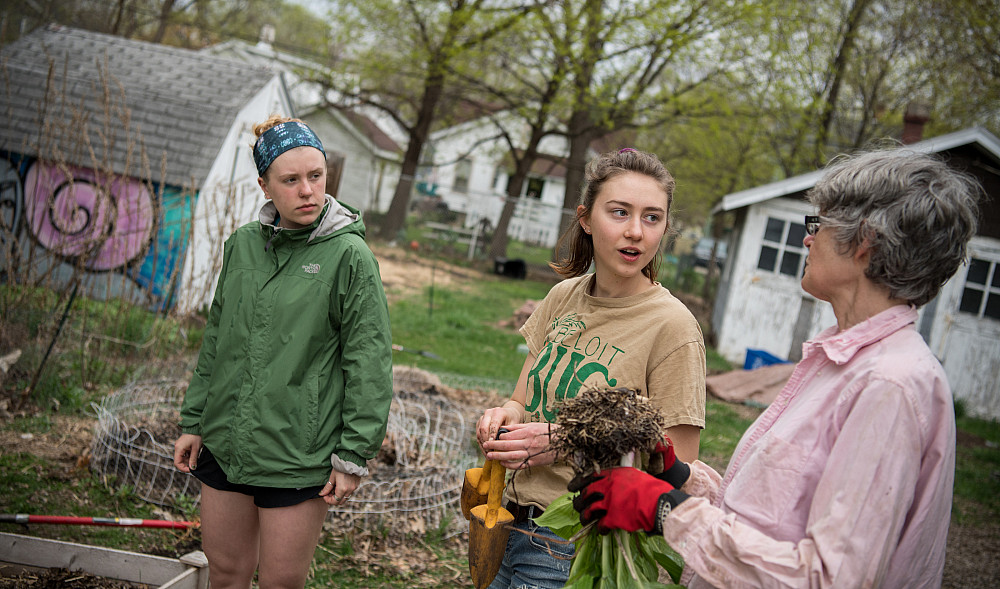
Credit: Howard Korn Photography
Through the relationship with Bon Appetit, students are able to experience firsthand how farming operates as a business. A shared spreadsheet tracks what the kitchen uses the most and what they’re willing to pay for a pound of each ingredient. The current set of students have focused their efforts more toward paying attention to consumer demand and growing the food Hnilo and his team will pay for. Before growing something more experimental, like chocolate basil, the gardeners will first reach out to see if it’s something the chefs can use, then decide what amount of the plant would make the most financial sense from seed to recipe.
From there, students have to play an environmental guessing game. How many plants need to be initially grown to make up for outside variables that might kill part of the crop? When is the ideal time to harvest each item? Where in the garden will each particular plant thrive the most? Since the garden’s inception, students have become more adept at keeping records that track things like where a row of diseased cucumbers grew, but even with these reference points, there’s no telling what strategy will be most successful for the more than a dozen varieties of herbs and vegetables that are grown from year to year.

Bui agrees that the lessons learned go beyond the surface. “Gardening is a combination of different skills: communicating, researching, and collaborating,” he says.
In the years since Bohrer graduated and left the garden, he’s done very little in the way of planting and harvesting vegetables, but says he uses the skills he picked up while at BUG daily as a project manager for Epic, a medical records software vendor based in Wisconsin. In fact, he’s currently representing the company in the Netherlands, where urban farming is commonplace.
While each semester of volunteers learn how to navigate the pitfalls of the day-to-day of urban farming, the lack of a stable team leaves bigger challenges hanging in the balance moving forward. Even if this round of students figures out an economic system to sustain the summer, the next group might have to step in cold to solve larger financial issues.
“One thing the students have to be realistic about is that it’s not going to generate enough money to pay them to work in the garden,” Brewer says. “In the long term I think there’s going to be a question of, how do we keep this going when there is in fact not enough money?”
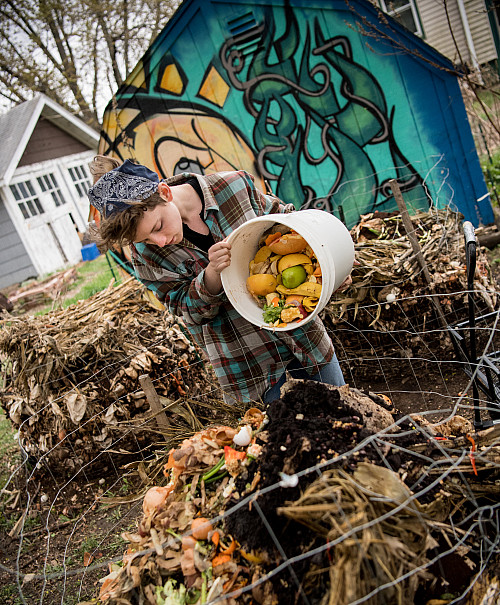
Credit: Howard Korn PhotographyFredericks has thoughts on how to curb some of the garden’s cost while expanding the program. The ideas range from applying for more grants to starting more gardens on campus to selling individual Community Supported Agriculture (CSA) boxes filled with BUG produce to students throughout the year. In August, student gardeners produced their first CSA boxes, filled with tomatoes, beets, carrots, kale, and a tasty piece of focaccia bread for good measure.
Fredericks says she realizes that once she leaves Beloit, decisions like launching a CSA program will no longer be in her hands.
“Aliza, Preston, and I are really good at coming up with plans and ideas,” Fredericks says, “But occasionally we have to remind ourselves that the nature of our garden, and as with most community gardens, it’s a group effort. We don’t know what future Beloiters will want to do with the garden, but for now we can focus on setting our plants up for success and getting as many good veggies to students as we can.”
But even with the inevitable changing of the guard, one constant has been the level of dedication from those involved, the kind of dedication that makes students excited to talk at length about dirt whenever possible.
“I haven’t been part of any other club that’s been so passionate and would get so excited about something like compost,” Fredericks says. “I now think that compost is the coolest thing in the world.”
Brianna Wellen is a freelance culture journalist who’s written for the Chicago Reader, The A.V. Club, and Splitsider.


